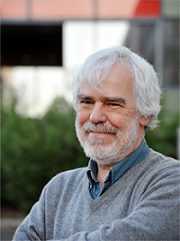 |
| The wild poliovirus as seen through a microscope--Courtesy of the Global Polio Eradication Initiative |
Only a few hundred cases of polio are reported each year, but a synthetic vaccine could be the key to eradicating the virus for good. Scientists are teaming up to develop a synthetic vaccine in an effort to address some limitations of the existing oral vaccine.
The project, which will be funded by a $674,000 grant from the Bill & Melinda Gates Foundation and the WHO, was announced at the annual meeting of the American Association for the Advancement of Science.
According to BBC News, the current oral vaccine uses a weakened version of the virus, which provokes an immune response. However, the vaccine can cause infection in a few individuals, from whom the virus can spread to other, unvaccinated people. An artificial vaccine would not have this danger.
 |
| Dave Stuart |
"The idea of the synthetic vaccine is that it contains no genome--it's virus free," said Dave Stuart, a professor of structural biology at Oxford University, as quoted by BBC News. Stuart is a member of the team, which includes scientists from Leeds, Oxford, Reading and the Diamond Light Source, the U.K.'s national synchrotron science facility. "So it's made, in a way, like a superchemical, a complicated chemical, that assembles itself to look like the virus but has no way of ever replicating."
But maintaining the shape of "something that looks like the virus but doesn't contain the genome" is difficult. The team, which previously worked on a synthetic vaccine for foot-and-mouth disease virus (FMDV), solved this problem.
"We had to use a detailed knowledge of how the atoms in this complicated structure were arranged to then go in and do some molecular re-engineering to make it more stable, so that it could hang around long enough to induce enough protective response from the immune system," Stuart told BBC News.
FMDV, which affects cloven-hoof animals, is in the same family as the poliovirus. The team feels that its success with the FMDV vaccine bodes well for its efforts to produce a synthetic polio vaccine.
While the synthetic vaccine could be the last push to eliminate all polio cases, the team warns that vaccination should continue beyond the last recorded case so that polio will not have the chance to make a comeback.
- read the BBC story